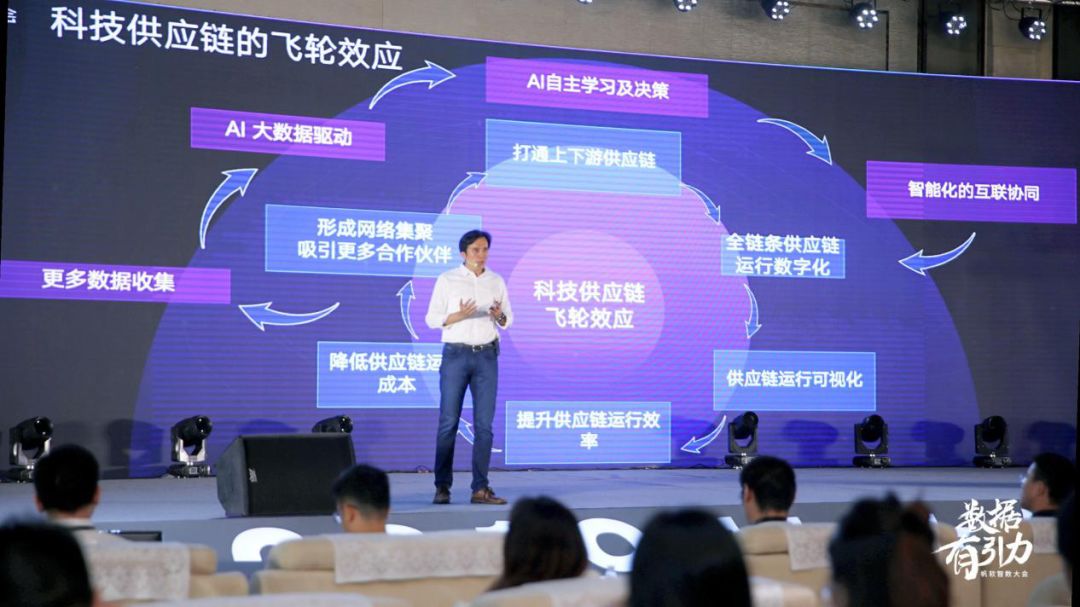JUSDA CTO Lyu Taixin: “Flywheel Effect” of Technology-empowered Supply Chain
JUSDA CTO Lyu Taixin: “Flywheel Effect” of Technology-empowered Supply Chain
The emergence of Internet of Things, Big Data, Artificial Intelligence and other technologies has driven the development of the digital economy and changed the industrial and economic landscape. With consumers’ increasing demand for customized products and instant services, the supply chain has become more complex. The entire supply chain network needs more information, real-time data analysis and internal and external collaboration tools than ever before. In this context, digital supply chain stands out with its prominent advantages, and a lot of enterprises are pursuing it.
From August 15th-17th, 2019, the FanRuan Intelligent Data Summit was held in Nanjing International Youth Conference Center. The summit brought together a lot of elites in the industry. The seven parallel sessions on major industries held discussions on the value of data management and generated many wonderful ideas. At the 1000-person forum held on August 16th, FanRuan CEO and Co-founder Chen Yan, JUSDA International Supply Chain Management Co., Ltd. (hereinafter referred to as "JUSDA") CTO Lyu Taixin and other industry elites, came up on stage and spoke about the “gravitational theory” in the field of Big Data from different perspectives. After the main forum, reporters from 10000Link held in-depth discussions with Lyu Taixin on Big Data, digital supply chain, JUSDA’s supply chain development path and various other topics.

In his speech titled “Releasing the Potential of Science and Technology, Realizing the ‘Flywheel Effect’ of Supply Chain”, JUSDA CTO Lyu Taixin shared the development direction of supply chain, business opportunities in the B2B supply chain market and JUSDA’s approach towards developing digital supply chain. He believes that the supply chain visualization platform and Big Data analysis will be the future of digital supply chain development, especially in the face of the major challenges of fierce fluctuations in customer demand and the urgent need to strengthen the comprehensive supply chain management capacity, faced by the global supply chain industry. On the one hand, there is a huge demand for value-added data assets, on the other hand, there is the problem of large disconnected data silos of traditional supply chain management. Enterprises often face a dilemma in such circumstances. Only by giving full play to the value of data and promoting the digital transformation of the supply chain can enterprises rejuvenate themselves and be effectively reborn.

I. B2B supply chain has broad market prospects, and the trend towards digital supply chain is growing
As a company with professional lean supply chain logistics management capabilities and management experience, JUSDA is already on the way to realize the evolution of digital supply chain from "chain" to "network". The trend of digital supply chain development is moving towards supply chain visualization platform, Big Data analysis, automated simulation tools and cloud computing. Lyu Taixin believes that there are huge business opportunities in the B2B supply chain market; 80% of the total supply chain cost comes from the B-end market, and it is expected that the global B-end supply chain market will exceed RMB50 trillion by 2022. The huge market potential is not only an opportunity to develop the supply chain, but also a fertile ground for the growth of digital supply chain.
Under this trend, JUSDA has successfully built a data-driven business platform this year, creating a one-stop platform architecture. It promotes supply chain logistics transformation and upgrade through three steps—business data, data capitalization and asset valuation. This will drive decision-making analysis and help enterprises to see the changes brought about by the supply chain through information technology.
Speaking about JUSDA’s strategic layout in the global intelligent supply chain, Lyu Taixin told 10000Link that JUSDA is building a real-time, flexible and open supply chain collaboration platform. It can meet different customer needs in different scenarios. It linearly connects brands, suppliers, manufacturers, service providers, channel providers and end-users, providing cross-system, cross-industry and cross-regional interconnections, and extends to external upstream and downstream enterprises, thereby forming innovative synergies. The platform’s core objectives are to improve quality and efficiency, reduce costs and increase savings by collecting, analyzing and utilizing Big Data from all enterprises in the supply chain. The platform helps optimize task coordination, information sharing and strategic synergies, thereby realizing the operation of an open social ecological platform.
The real-time supply chain collaboration platform can not only improve the information visualization of the supply chain and assist customers to make quick decisions, but also realize intelligent early warning. The platform also has predictive functions, and automatically analyzes multiple solutions for customers to choose from.
II. The "Flywheel Effect" of Science and Technology Supply Chain is conducive to building the digital supply chain ecosystem
As a senior executive and expert in logistics industry with rich experience, Lyu Taixin used the "flywheel effect" to explain how technology can empower the supply chain and drive digital supply chain. Taking the flywheel example, to make a stationary flywheel work, you have to push it repeatedly and it requires a lot of hard work at first, but with the increase in momentum and kinetic energy, the flywheel rotates faster and faster, and it takes less and less effort.
Lyu Taixin explained to 10000Link that by scientific and technological means, the supply chain can achieve the "flywheel effect"—in the beginning, digital supply chain development may be slow or require a lot of hard work, but as the entire supply chain digitization process continues to advance, as supply chain synergies continue to increase, and the entire supply chain’s efficiency is greatly improved, the "flywheel effect" will gradually become prominent, and operating a digital supply chain will no longer be a difficult task for enterprises. All initial efforts and attempts contribute to this result.
Lyu Taixin said that JUSDA hopes to build a digital supply chain ecosystem, linking the upstream and downstream of the supply chain through information technology, which can greatly improve the efficiency of enterprises in the whole supply chain operation process. This is the value and contribution that JUSDA hopes to provide to upstream and downstream enterprises as well as the entire industry.
At present, JUSDA is focused on supply chain science and technology, such as building a one-stop platform architecture and reconstructing information application systems by using internet thinking. At the same time, JUSDA has been consistently investing in automation equipment, unattended distribution, and other technologies to create an automated solution for the entire supply chain logistics process. Lyu Taixin also added that JUSDA’s partners now operate their entire process on the real-time supply chain collaboration platform, which is proof that this solution is feasible and can be used by enterprises.
III. Market forces the transformation and upgrade of supply chain—Enterprises must continue to move forward
The digital transformation of supply chain has arrived. Although this situation is caused by market pressure, from another point of view, this trend will bring a lot of positive effects to industries and enterprises. Enterprises will pay more attention to the improvement of supply chain management capabilities, and the upstream and downstream of the supply chain will be more coordinated. Lyu Taixin is highly optimistic about the digital transformation trend of the supply chain. In his speech at FanRuan Intelligent Data Summit, he mentioned that enterprises can improve efficiency and reduce the cost of operating the entire supply chain, which will be conducive to the formation of a robust supply chain ecosystem, and will lead to enhanced efficiency and increased profits. This will encourage more and more enterprises to join the ecosystem. As more and more enterprises join the supply chain ecosystem, a positive cycle will be formed, thus the upstream and downstream supply chain will be connected. Lyu Taixin believes that such a supply chain ecosystem will undoubtedly accelerate B2B supply chain synergies.
Lyu Taixin also had excellent suggestions on how to deal with the trend of digital transformation of supply chain, based on his years of experience in supply chain logistics management. He believes that most enterprises focus on their respective core business, and may not have supply chain management experience and capabilities. In such a scenario, they can choose to continue to cultivate their core business and outsource non-core business such as supply chain management to more professional enterprises. Lyu Taixin told 10000Link that JUSDA has consistently strived to share its 20 years of experience in supply chain logistics management through solutions for different industries and enterprises by means of science and technology and information technology, as it aims to resolve problems related to supply chain management.
At the same time, Lyu Taixin believes that enterprises need to be flexible, seek new ideas and build their talent system, as these are key requisites for success. Only by facing difficulties and advancing bravely can enterprises create greater possibilities.
At the beginning of 2019, JUSDA started the first year with RMB2.4 billion—the largest single financing record in the field of B2B supply chain logistics. It brought warm wind in the bracing cold winter where capital has been scarce, and instilled confidence in the current depressed market. Leveraging its capital and science and technology resources, JUSDA has been advancing rapidly in supply chain logistics management, and it continues to focus on its initial goal of "Realizing supply chain upgrade and innovation for global B2B manufacturing enterprises". A better future is being discovered on the journey to fulfilling this initial goal.